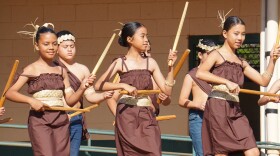Washington Middle School in Honolulu’s McCully area is a Title I school. That means more than 60% of its students cannot afford lunch. But they’ll soon have access to a powerful educational tool: an innovative recording studio.
“Awe-inspiring. Jaw-dropping. I cannot speak highly enough of what I saw. It’s as if they spared nothing… in a school in the middle of town where you would never expect it," says Clarke Bright, bandmaster of the Royal Hawaiian Band.
“It’s a prized possession for Hawaiʻi, for what we want to do for education or for that area. It’s unbelievable!”
Bright was also the longtime band director at Kamehameha Schools — and he sees enormous potential for teaching, for career development, and for partners.

“You could also do a public-private partnership, which is a government situation, but partner with a private group all across the world, really. Even the Royal Hawaiian Band. We’re a city-run agency. That’s government-with-government. I mean, it’s just endless. We’re only limited by our own creativity.”
While some critics question the $3 million cost of the studio, Washington Middle School Principal Michael Harano says it’s crucial to reach this age group.
“When do people figure out what it is they’re really wanting to pursue? Many, many times, it’s during the 10- to 15-year age. And by the time kids get to high school, it’s often too late.”
Harano says the price of the studio is not extravagant. He calls it a renovation — and says that’s an important distinction for how the Department of Education allocated the funding.
“Which again, is a renovation, and not a new construction. So to me, we had to squeeze every bit that we could out of it. I would say it’s a miracle. I believe that something like this has never been done in the DOE.”

Harano admits there’s no ready-made curriculum for the areas the state-of-the-art studio could be used to teach.
“But now we’ve got to back-fill, and so what we’re working on are all the things — the production, the fine arts — that kind of programming that will then allow us to have kids that are ready, able, to take advantage of what this studio has to offer.”
And Harano says the facility could be shared with the entire community.
“While it’s on our campus, we didn’t envision it as a Washington Middle School studio. It’s actually to be considered a state DOE facility that we are wanting to expand to students and teachers across the system.”
In part three, we’ll get the perspective of another educator who has reached students with an innovative approach to matching technology with the classroom. This is part two of a three-part series. Go back and listen to part one here.





